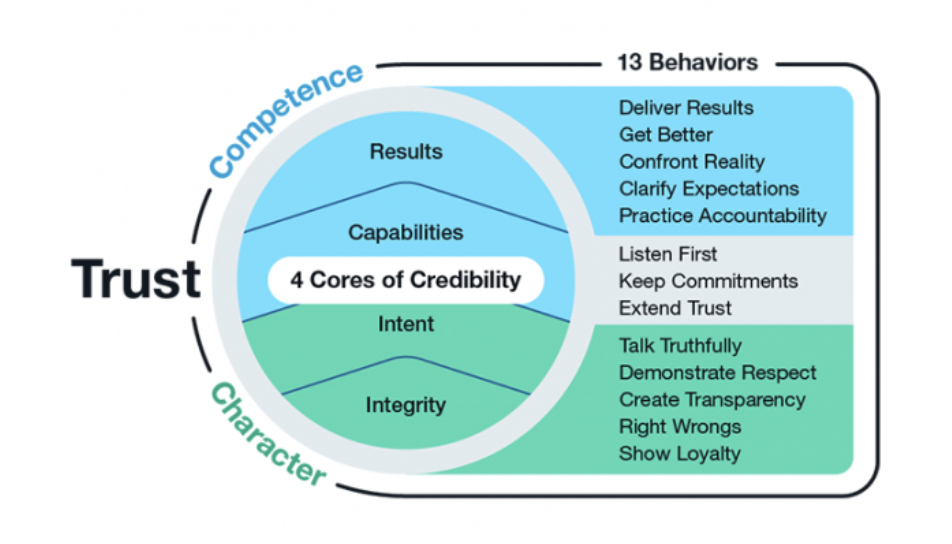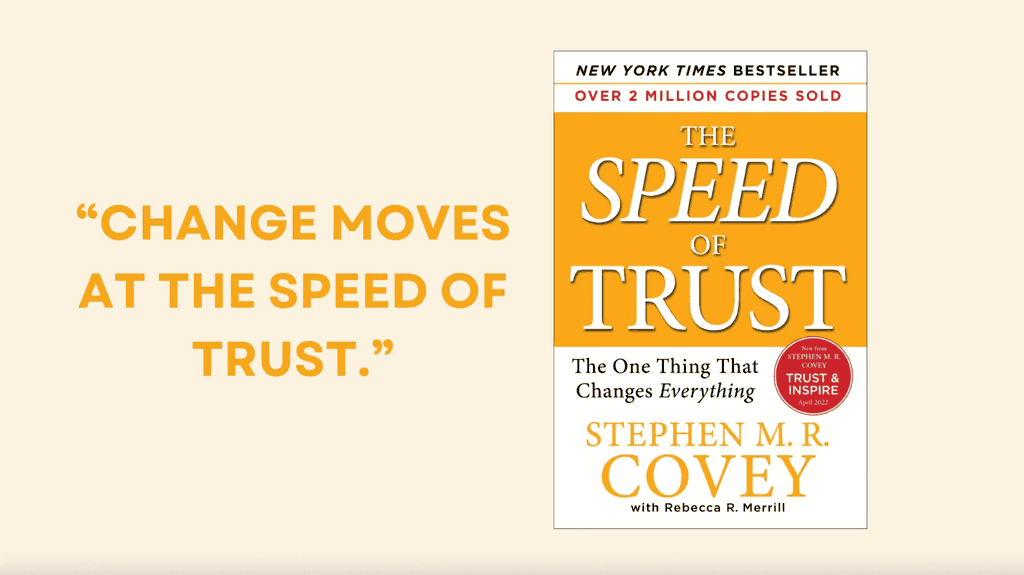The Speed of Trust Summary: Build Stronger Relationships
Learn how to become an impactful leader with The Speed of Trust with BeFreed's book summary and key insights.

Imagine this: You're leading an ambitious global team, filled with brilliant minds and cutting-edge resources, yet something feels off.
Projects move slowly, meetings drag on endlessly without clear decisions, and tasks that should take days are stretching into weeks. Despite your talented workforce and advanced technologies, progress is sluggish, morale is low, and frustration is high.
What’s the missing ingredient holding your team back?
The answer, surprisingly, is trust.
Often overlooked and underestimated, trust is the hidden variable that can accelerate success or grind it to a halt. In his insightful book, The Speed of Trust: Unleashing the Power of Relationships, Stephen M. R. Covey reveals how trust isn't just a pleasant virtue - it's a critical business strategy that directly impacts speed, efficiency, profitability, and long-term success.
In this summary of The Speed of Trust, BeFreed will unpack Covey's core principles, explore why trust matters now more than ever in 2025, and show you practical ways you can leverage trust to unlock extraordinary results in your personal and professional life. Let's embark on this journey to understand and unleash the power of trust, and discover how you can build a high-trust world that benefits everyone.
Key Takeaways
- Trust is developed in layers: personal, relational, organizational, market, and societal.
- The foundation of trust involves integrity, intent, capabilities, and results.
- Extending trust and aligning systems with core values are essential for establishing a high-trust culture that drives success.
Unpacking The Speed of Trust: Summary and Key Insights
Trust as the Hidden Variable
In today’s fast-paced world, one intangible factor makes all the difference between success and stagnation: trust. More than just a feel-good concept, trust functions as a powerful economic driver. It can accelerate processes, reduce costs, and pave the way for innovative leadership and high-performance cultures. Whether in our personal lives or in business, The Speed of Trust transforms relationships, empowers teams, and multiplies success.
“In a high-trust relationship, you can say the wrong thing, and people will still get your meaning. In a low-trust relationship, you can be very measured, even precise, and they’ll still misinterpret you.” ― Stephen M.R. Covey
Consider a multinational corporation struggling with low employee morale and declining productivity. Various strategies had failed until it was discovered that a pervasive lack of trust was undermining every initiative. This common scenario often costs organizations billions in lost productivity.
However, when trust is built, organizations enjoy faster decision-making, clearer communication, and significantly reduced operational friction.
The Economics of Trust: Speed and Cost
Think about trust as the lubricant in the machinery of business and relationships.
- High Trust = High Efficiency: When trust is high, everything moves faster and more smoothly. Decisions are made quicker, communication is more effective, and execution is more efficient.
- Low Trust slows down everything: People become suspicious, guarded, and bureaucratic. Simple processes become complex, and costs skyrocket.

Warren Buffett once completed a major acquisition in a single phone call, and the whole deal was wrapped up in less than a month. How? Because of the high trust between the parties involved. Compare this to the typical corporate acquisition, which can take months or even years of due diligence, negotiations, and paperwork. The difference? Trust.
This principle applies not just in business, but in every aspect of our lives. In high-trust relationships, communication is easy and efficient. In low-trust relationships, even simple conversations can become minefields of misunderstanding and conflict.
The Essence of The Speed of Trust
At its core, The Speed of Trust reveals that trust is not just an abstract idea. It is a tangible, measurable asset that can be developed to enhance performance in every aspect of life. The book breaks trust into five interrelated components, or “waves,” that build on one another to create a ripple effect - from personal credibility to societal impact.
The Five Waves of Trust
1. Self Trust
The journey to high trust begins with ourselves. Self trust is about developing the credibility that makes us trustworthy to others. It's based on four core components that create personal credibility:

4 Cores of Credibility (Source: FranklinCovey)
- Integrity:
- Being congruent in actions and words
- Walking your talk
- Authenticity in every interaction
- Intent:
- Genuine motives
- Prioritizing the interests of others along with your own
- Capabilities:
- Developing talents, attitudes, skills, knowledge, and style
- Staying relevant in a rapidly changing world
- Results:
- A strong track record of performance
- Consistently delivering on promises
2. Relationship Trust: The Behavior of Trust
Once self trust is established, the next step is nurturing trust in your relationships. Trust in personal and professional settings is built through behavior - what you do matters more than what you say.

13 Key Behaviors of High-Trust Leaders:
- Talking straight
- Demonstrating respect
- Creating transparency
- Righting wrongs
- Showing loyalty
- Delivering results
- Getting better
- Confronting reality
- Clarifying expectations
- Practicing accountability
- Listening first
- Keeping commitments
- Extending trust
Real-World Insight:
In one instance, a company known for its micromanagement reaped remarkable benefits after its leadership began extending trust rather than controlling every step. Employees felt valued and engaged, leading to increased innovation and productivity that ultimately boosted the company’s performance.
3. Organizational Trust: Aligning Systems and Structures
Trust extends beyond individual relationships into the entire organization. For an organization to foster a high-trust culture, its systems and structures must be aligned with its stated values.
Key Points to Consider:
- Value-System Alignment: Ensure that what the organization says (e.g., promoting collaboration) is reflected in its compensation and incentive systems.
- High-Trust Practices: Develop and maintain systems that bolster the core values across hiring, performance evaluations, and decision-making processes.
4. Market Trust: Building Brand and Reputation
Market trust is about the confidence that customers, investors, and other stakeholders place in your brand. In an interconnected world, trust influences customer loyalty, premium pricing, and crisis management.
Essential Strategies for Market Trust:
- Consistency:
- Deliver on promises consistently to build and maintain a strong reputation.
- Transparency:
- Operate with clear communication and prompt responses in times of crisis.
Case Study:
During the 1982 Tylenol crisis, Johnson & Johnson’s swift and transparent handling of the situation significantly increased public trust. By prioritizing customer safety over short-term financial gain, the company not only navigated the crisis but emerged even stronger.
5. Societal Trust: Contributing to the Greater Good
Societal trust is built when organizations and leaders look beyond immediate profits to consider the broader impact on society, encompassing environmental, social, and governance (ESG) factors.
Ways to Build Societal Trust:
- Stakeholder Focus:
- Address the well-being of employees, customers, communities, and the environment.
- Corporate Responsibility:
- Adopt sustainable and ethical practices that contribute to the greater good.
Real-Life Example:
Patagonia's unwavering commitment to environmental sustainability isn’t just a marketing strategy - it’s integral to their business model. This core value has led to profound societal trust, bolstering customer loyalty and fostering a strong employer brand.

The Dividend of Trust
The Speed of Trust makes it clear that trust is not a soft, intangible quality, but a measurable asset that drives performance. High trust leads to quicker decisions, enhanced communication, and increased productivity. By learning to build trust, starting with ourselves and rippling outward to our relationships, organizations, markets, and society, we can unlock significant dividends.
Why The Speed of Trust Still Matters in 2025
Trust remains a cornerstone of success in 2025, especially as AI-driven technologies reshape industries. With AI automating decision-making and streamlining operations, the speed of trust becomes even more critical: humans must trust the systems, data, and teams behind these tools to act swiftly and ethically. For instance, AI can accelerate processes like acquisitions (think Warren Buffett’s trust-based phone call deal), but only if stakeholders trust the AI’s outputs and the intentions of those deploying it. In a world where misinformation and AI ethics are top concerns, building trust ensures resilience, reduces friction, and unlocks the full potential of innovation, making Covey’s principles more relevant than ever.
Enhance Your Personal Development Journey with BeFreed
Are you willing to gain more knowledge and insights on how to develop leadership skills? BeFreed, the best AI knowledge companion, built to help you excel in the areas that matter most - leadership skills, efficiency, productivity, mental health, social skills, business, and beyond. Chat with your AI reading buddy about your life and goals, and it’ll recommend books and make a summary tailored just for you. Already reading a specific book? Dive deeper with focused discussions to enrich your understanding and learning experience.
On top of that, BeFreed grants you access to 50,000+ AI-powered book summaries, letting you absorb key insights from trending titles in under 10 minutes. With one click, you can zoom in on the section that piques your interest and read a more detailed summary of that part - revolutionizing the way traditional book summary apps work. Anytime, anywhere, BeFreed turns life’s small moments into meaningful learning opportunities.






